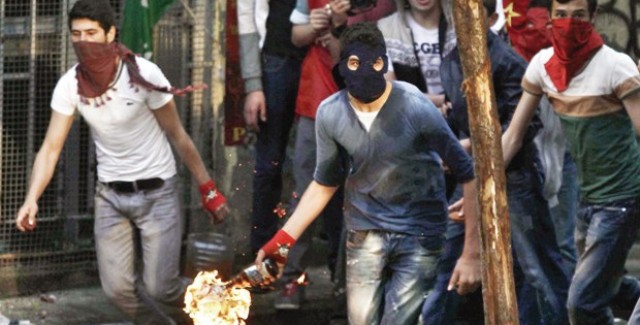
The domestic security package has been one of the hot topics of Turkish political scene in recent weeks. The government officials are trying to legitimize the bill that will equip law enforcement authorities with extensive powers and authorities by referring to the protests that occurred in October 6-7, 2014. The slogan “To the streets for Kobani” had triggered these protests, and about 50 people had died in the resulting clashes. The protests had undermined the public order mainly in southeastern provinces, depriving many citizens of security of life and property.
The bill that is currently on Parliament’s agenda allows law enforcement authorities to wiretap personal communication without a court order keep people under custody up to 48 hours without court order and search you and your car without a court or prosecutor’s order and open fire on you if you carry an incendiary, suffocative or explosive material in any protest. By equipping law enforcement authorities with these anti-democratic powers and authorities –which are unacceptable in any liberal democracy– the government seeks to strengthen its hand and use these protests as an excuse in it. In a sense, it tries to make the public settle for certain unfavorable provisions by proposing to introduce more unfavorable ones.
Furthermore, the government officials try to justify certain provisions of the bill by arguing that similar provisions are in force in Western democracies as well. These provisions include aggravated penalties for the use or sale of drugs in the vicinity of educational institutions, the redefinition of Molotov cocktails as incendiary substances and the banning of covering or masking the face during protests. Yes, similar arrangements exist in the Western democracies. To say that something exists in Western democracy does not automatically make that thing correct or right. But, given the good performance of Western democracies as regards human rights, we can say that the practices in those countries may supply us with “best practice” models.
I think the tricky point is the phrase “best practice.” The problem is that the correct rules and institutional borrowed from the West can be abused or implemented wrongly. Take the banning of covers or masks on the face during protests or demonstrations for example. It is easy to understand the rationale for this ban. To ensure that law enforcement authorities can learn the identity of a protester who performs a criminal act is a legitimate purpose. This is a justification that sounds reasonable even to a person from a Western democracy.
However, a protester in Turkey does not pay the same price with a protester in a Western democracy. Unfortunately, Turkey does not truly recognize the right of its citizens to dissent or disagree with the state or its representatives. When people perform dissident acts against the representatives of the state, they are profiled, and they face the risk of not being accepted into civil service or being dismissed from the civil service or being deprived of promotion or not being given loans by public banks or being visited by tax officers. I have recently listened to a personal story. During the jury interview of the applicants for a master’s program, one applicant said that he was a civil servant and before he was admitted to this job, he was interviewed and his views about the ‘parallel structure’ were inquired and he was asked if he attended the Gezi Park protests. It is very likely that if the candidate hadn’t told the jury members what they wanted to hear about the ‘parallel structure’ or that he lent support to or personally attended Gezi Park protests, he would have failed the interview. In an effort to avoid such nuisances, dissident people feel the need to conceal their identity in the protests they attend. But, with the new regulations, they will not be able to conceal their identity, and they will either dare pay big prices in attending the protests or tether the “political animal” (zoon politikon) in them that urge them to protest the unfavorable government practices and sit at home.
Yes, it is reasonable to ban face covering or masking during protests or demonstrations. What is not reasonable is to make people pay a price for using their fundamental civil and political freedoms. These practical abuses and malpractices make me, as a liberal democrat, worry profoundly in the face of the domestic security package that contains a number of provisions that can hardly be defended even from a theoretical perspective.




